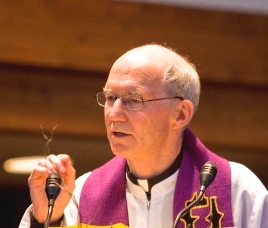Last week some parishioners and I made a pilgrimage to Sister Barbara's grave. It involved a five-day road trip: two days travelling to San Francisco, one day at Holy Cross Cemetery where she is buried and two days returning to Monroe. It was an enjoyable, refreshing time and it gave opportunity to reflect on her life, to pray for her eternal rest and to ask her to pray for us.
In our reading from Ephesians St Paul tells us to live in a manner worthy of the call we have received. Sister Barbara did that. She was part of a remarkable generation - like Archbishop Hunthausen who died last Sunday - men and women who made a commitment at an early age and carried through their entire life. At Holy Cross Cemetery we celebrated Mass on July 25 - the 66th anniversary of Sister's vows: vows she made at age 18 and carried through in good times and in bad, in storms and on sunny days. How did she do it? To understand we have to take a step back.
At Sister's grave we placed a bouquet of sunflowers - her favorite. She liked them for their sturdy beauty but there's more. If you look up sunflower in a botany book it says: "Sunflowers turn their faces toward the sun as they track it across the sky -- an activity known as heliotropism, or solar tracking." On her memorial bench - which we will dedicate in three weeks - you will see this quote from Psalm 27: "Of you my heart has spoken 'seek his face'".
Like a sunflower with its solar tracking Sister Barbara turned her face to God. She always said, "God is good; he is so very good." By turning to God a person can live a life worthy of the calling he has received. St. Paul says God wants us to live with patience, bearing with one another. Sister Barbara learned to put up with a lot so she could serve the people God entrusted to her. She did not live for honors or ego gratification but when she did receive an honor it delighted her. She sensed the honor gives glory to the Father. As St. Paul says we have one hope because of our call, one Lord, one faith, one baptism, one God and Father of us all who is over all and through all and in all.
We're going to honor Sister Barbara on August 19. That Sunday we will have one bilingual Mass at 10 am followed by the parish picnic and the dedication ceremony at 1. Please use this event to evangelize - take an invitation for family members and friends. Say, "We're having a dedication in honor of Sister Barbara; please join us." The dedication will be short and sweet. Then you will have time for a hamburger or hot dog.
At the dedication we will focus on two symbols: the sunflower and the turtle. Turn toward God and keep moving forward - steady and firmly but you gotta stick your neck out. It's easy today to withdraw into a cell phone or some drug. God wants something different. Next week we'll hear about that "something different" as Paul tells to put away the old self and put on the new self. Or as we used to say, "put on the new man". That's for next week.
For today take home this: Live a life worthy of the call you have received: with patience bearing with one another. After all, like Sister Barbara shows us: we have one hope because of our call, one Lord, one faith, one baptism, one God and Father of us all who is over all and through all and in all. Amen

 RSS Feed
RSS Feed
